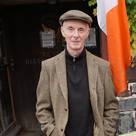 Paul Ilechko was born in England but has lived much of his life in the USA. He currently lives in Lambertville, NJ with his girlfriend and a cat. Paul has had poetry published recently by Dash Literary Journal, Gravel Magazine, Gloom Cupboard, MockingHeart Review and Slag Review, among others. The Age of Mud and Darkness Black earth is better than red. A rich, loamy soil, seeded and worked, fertile. Black mud; truly black when wet, soaking up the pouring rain. A light, ashy gray when dry, but never sienna, never that toasted red earth, signaling the hardness of red clay. The best earth is found in the valley. Walk through those bottomlands in your muddy hiking boots. Reflect on the glory of agriculture, rather than the overwrought cliché of the mountain top. Once a battlefield – like all flatlands, everywhere – but now turned into perfect farmland. Yet now we sink into the mud. Knee deep in this squalid blackness, sinking as we failed to comprehend the changes that had been, at the last, inevitable. The absolute deterioration of the social contract, the end of civil society as we have known it – we plunge into darkness. The Neighbor She abides, unacknowledged, in the corner of her garden, next to where the mulch pile used to be. To her left, that’s where the chrysanthemums once grew, their flamboyant blossoms shivering in the Autumn breeze. Her husband, long dead, was a horticulturist. Famed in this small town for the beauty of his landscapes, every season was tinted with his unique sense of color, ordered and aligned around a singular creative vision. Behind her stands the decrepit ruin of his crumbling greenhouse. Cracked glass and peeling paint mirror her mental state. She no longer recognizes any of the passersby, not even old friends from those years that have slipped through her fingers. Alzheimer’s has eaten her brain. She stands silently swaying. The curious smile playing on her lips is disconnected, an inchoate response to external stimuli, as she exists In a world of her own, one that we may never enter. Chagallian All houses are yellow, but some are more yellow than others. The man in blue swoops down over the wet slate rooftops to the girl in the red dress and kisses her boldly on her tear-stained cheek. It’s a world of color, of stained glass and flying horses. The sad goat sits quietly, reading the farmer’s autobiography. In the middle distance the plangent melody of a violin is heard. The nude girl marries her childhood lover, eyes averted from the terrifying crucifixion that looms above. Life and death, love and fear, all are present here. The colors of emotion mingle and glow. The music is not visible, but we know, instinctively, that it’s there. Synesthesia demands that the violins play only yellow notes. The bass answers, its throaty rustic song colored deepest blue. As darkness falls the birds return, guiding the guileless lovers back to the contrapuntal amber glory of their bridal suite, to their laddered windows and their spotless laundered sheets. The River The river flows rapidly here, slipping over the rocks like an eel sliding from the mouth of a dead horse. It's a very British river, never showing any anger. Downstream it deepens, becomes sluggish. But here, in this sad provincial market town, a passerby might walk across, skipping from stone to stone to keep his footwear dry. In the city, the canals steal water from the fat and lazy stream. Overshadowed by the hustle of the streets, they reclaim preeminence with their subtle redactions of reality. The riverboats shine red and purple, reflections rippling hazily in the gloomy waters. Hemmed in by tower blocks, those miserable stockades of the poor and defenseless. Further still, and the foggy shores spread their legs wide as the sea penetrates with its probing, salty tongue. The giants of nautilus prowl the horizon, black shapes of unloved portentous bulk. And this is where the river finds peace. A hundred miles of tortured wandering, never free from its confining banks, dissolving in sand and mud as the estuary prevails. The Library In the old library, the books quietly disintegrate. Some of them have not been touched by human hands for fifty years or more. A fine, papery dust fills the air, visible only when sunlight glances in through the grimy skylight. The quality of light down here is almost aquatic; it would be no great surprise if an eel were to squirm around the nearest stack, moving with a silent but eerie grace as it slides out of view into the musty distance. The odor in the room is dampness mixed with gasoline. The heating system is erratic; sometimes too cold to stay here long, sometimes so warm that it attracts a crowd of sleepy undesirables, reeking of cigarettes and gin. Despite everything, there is a peacefulness that is difficult to obtain anywhere else. No one speaks aloud, allowing my thoughts to develop at their own speed, pulling me along on the lengthy, devious path to self-discovery. If I were impossibly wealthy, I would create libraries in every town. I would place them in old, crumbling edifices, the kind of building where silence echoes louder than speech, where the unspeaking introvert can dance inside their own mind.
0 Comments
Leave a Reply. |
Categories
All
|
 RSS Feed
RSS Feed